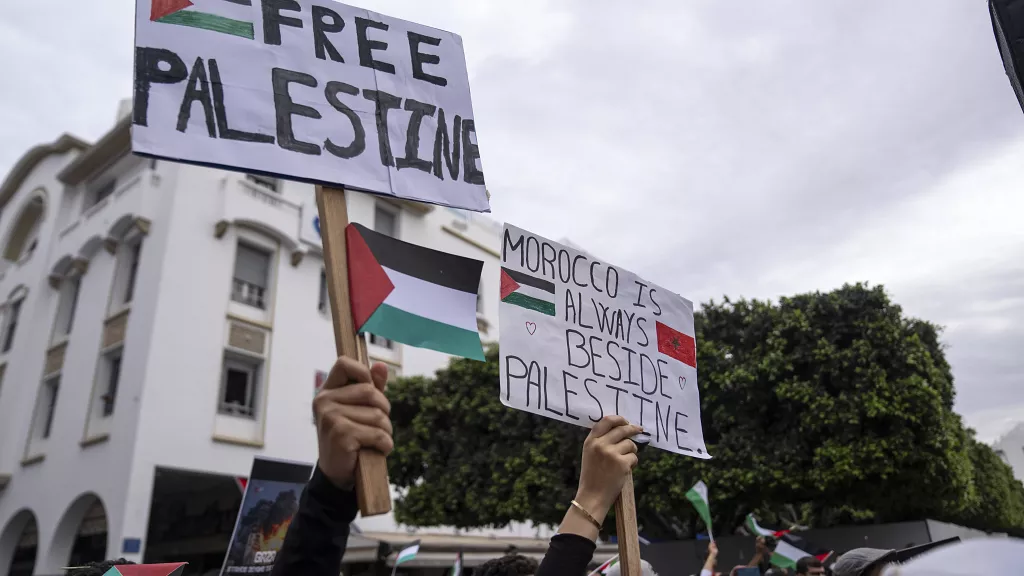
In Morocco, the ongoing limitations on what imams can preach about the Gaza conflict have sparked debate among politicians and activists, highlighting the tension between state control and public sentiment on sensitive political issues. During a recent session in the Moroccan parliament, socialist lawmaker Nabila Mounib raised concerns about restrictions on preachers’ freedom to speak about the Palestinian cause and support for religious struggle. Mounib suggested that imams were being prevented from discussing the Israeli-Palestinian conflict, which has remained a source of significant unrest and public protests in Morocco since the outbreak of the Israel-Hamas war.
Mounib’s comments, made on November 5, are part of a wider discussion on the relationship between the Moroccan government and public opinion on the Palestinian issue. However, Moroccan officials have disputed the claim that preachers are outright banned from addressing the conflict. Ahmed Toufiq, the Minister of Islamic Affairs, denied that imams were silenced on the issue, stating that any imam could denounce injustice and barbarism. “Any imam who talks about barbarism and injustice and denounces them is welcome,” Toufiq asserted.
Despite this, pro-Palestinian activists argue that the limitations on preaching reflect a broader political dynamic in Morocco, where the government is trying to balance its ties with Israel and its citizens’ strong pro-Palestinian sentiments. Ahmed Wehman of the Moroccan Observatory for Anti-Normalization pointed out that imams have not only a right but a religious duty to speak out on such important matters, suggesting that the government’s attempts to limit public discourse on Palestine do not reflect the will of the Moroccan people.
Morocco, which normalized diplomatic relations with Israel in 2020, has one of the largest and most historically significant Jewish communities in the Arab world. However, the country’s decision to establish ties with Israel was deeply unpopular with many Moroccans, and the war in Gaza has intensified protests and unrest in the streets. Tens of thousands of Moroccans have taken to the streets in recent months to demand that the government sever diplomatic relations with Israel, showing widespread public opposition to the normalization process.
These protests have brought together people from diverse political backgrounds, including both left-wing groups and Islamist factions like Al Adl Wal Ihsane, which is officially banned but tolerated in the country. Some members of this movement have faced arrest and imprisonment for their outspoken views on Morocco’s relationship with Israel. The protests also reflect broader social grievances, such as rising living costs and housing inflation, particularly in Morocco’s larger cities. Geopolitical analyst Hicheme Lehmici pointed out that these economic pressures are fueling a larger social movement that links Morocco’s relationship with Israel to domestic discontent, particularly among low-income families.
The Moroccan monarchy, while maintaining widespread popular support in much of the country, faces growing dissent in recent years. The Israeli-Palestinian issue has become a flashpoint for anti-monarchy rhetoric, especially in the northern Rif region, where calls for greater democratic reform and criticism of the monarchy have gained ground. Lehmici explained that the public’s dissatisfaction with the Moroccan government’s ties to Israel has broadened the political discourse, bringing new voices of opposition into the open.
The historical control of religious discourse by governments in the Middle East and North Africa is not unique to Morocco. Francesco Cavatorta, a political science professor at Université Laval in Quebec, explained that many countries in the region, such as Algeria, Egypt, and Syria, have long controlled the messages delivered by imams in order to prevent religious leaders from challenging the state’s authority. In Morocco, this control over religious preaching aims to present the country as a tolerant Muslim nation while avoiding any messages that could destabilize national unity.
Morocco’s Ministry of Islamic Affairs has been particularly active in ensuring that imams adhere to official narratives. In 2017, during a period of significant political protests in northern Morocco, the ministry instructed preachers to denounce protesters and accuse them of causing division within the Muslim community. The ministry has continued this approach, publishing weekly sermon guidelines for imams to follow, particularly in the wake of political unrest.
The influence of the Moroccan government on religious discourse has drawn comparisons to similar restrictions in other countries where religious leaders are expected to toe the state line. In October 2023, Ali Erbas, the head of Turkey’s religious affairs authority, called for unity among Muslims in the face of global injustice, including the Israeli-Palestinian conflict, while delivering a sermon in Azerbaijan. This call for solidarity is echoed in many parts of the Muslim world, but in Morocco, the government’s limits on what imams can preach about the conflict reveal the delicate balance it must strike between managing internal unrest and navigating its diplomatic relationships with Israel.
As Morocco continues to face internal divisions over its stance on Israel and Palestine, the debate over imams’ freedom to address the Gaza conflict underscores the challenges the country faces in balancing political, social, and religious tensions.








